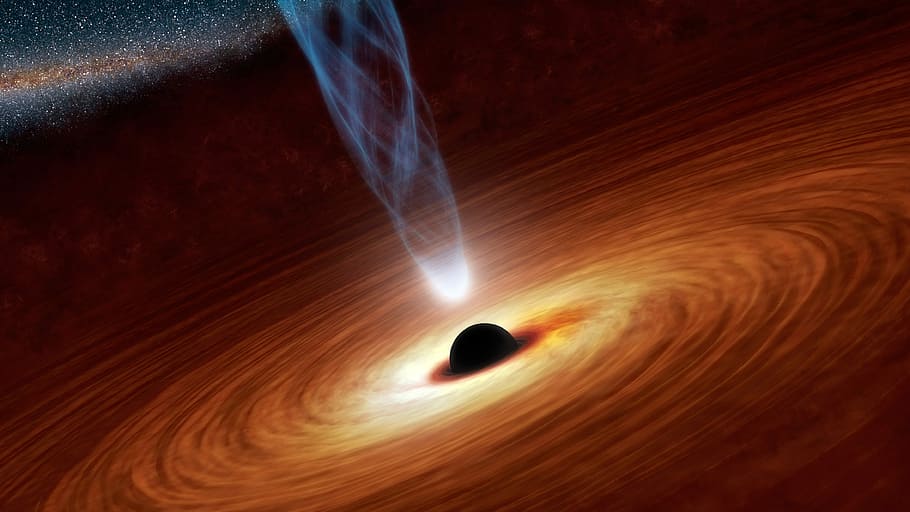Introduction
The study of the cosmos has long mesmerized and fascinated humanity, prompting scientists and scholars to dive deeper into the mysterious mysteries that lie within the world. Black holes are one of the numerous cosmic phenomena that continue to mystify and captivate us, and they stand out as some of the most fascinating and interesting creatures. On the other hand, fresh findings in the field of theoretical physics have led to the formulation of a novel idea known as the “Dark Hole Theory.” This fascinating idea and the possible ramifications it may have for our understanding of the cosmos are going to be the topics of discussion throughout this essay.
Understanding Black Holes
It is essential to have a solid understanding of black holes as a foundational concept before delving into the Dark Hole Theory. A black hole is said to be created when a big star runs out of its nuclear fuel and then collapses under the power of its own gravity, as stated by the conventional school of thought in astrophysical theory. This collapse causes a region in space that is extraordinarily dense and has such a strong gravitational pull that nothing, not even light, can get away from it.
The Singularity as Well as the Event Horizon
The event horizon is what distinguishes a black hole from other types of space-time phenomena. This is the point beyond which there is no turning back; anything that passes through it is sucked into the gravitational pull of the black hole and will remain there forever. The singularity is a region of infinite density and zero volume that is found in the heart of a black hole. Because the singularity is a place where the known laws of physics cease to function, it is an unusual and undiscovered zone.
The theory of the black hole
Within the field of theoretical physics, a concept known as the Dark Hole Theory arises as a speculative idea. The theory suggests that black holes, rather than leading to a singularity, may instead have the ability to establish gates to other dimensions or parallel universes. This hypothesis casts doubt on the widely held belief that black holes are the logical conclusion of the cosmos. Instead, it suggests that black holes may serve as entryways to uncharted spheres of existence.
Quantum Theory and the Concept of a Multiverse
In order for us to have any hope of comprehending the Dark Hole Theory, we will need to dig into the fascinating field of quantum physics and become familiar with the idea of the multiverse. The theory of quantum physics proposes the existence of an infinite number of parallel universes, each of which contains a unique set of potential outcomes for any given occurrence. According to the multiverse idea, all of these worlds coexist in the same space and time, and each one may be subject to an entirely unique collection of physical laws and characteristics.
The Dark Hole Hypothesis and the Idea of Traveling Through Multiple Dimensions
According to the Dark Hole Theory, which is a framework for examining the multiverse, black holes are hypothesized to connect the various universes that make up the multiverse. In the same way as black holes warp spacetime, they might also produce “wormholes,” which are fictitious tunnels that connect otherwise inaccessible parts of spacetime or even separate dimensions. These wormholes have the potential to act as entryways to other universes, which would make it possible to travel between alternative realms.
The Implications, as well as the Problems
Our knowledge of black holes and the very essence of the cosmos itself has undergone a paradigm change as a result of the discovery of the Dark Hole Theory. If it were proven, it would have a profound impact on the fields of cosmology and astrophysics, revealing hitherto unknown aspects of the fundamental rules that govern our very existence. Having said that, the hypothesis also raises a number of important concerns. Because the nature of the singularity and the physical principles that govern the region within the event horizon are not completely known, it is impossible to validate or reject the hypothesis in a way that is definitive.
Future endeavors in exploration as well as scientific research
To determine whether or whether the Dark Hole hypothesis is valid, it is necessary to do additional research and gather empirical evidence. This is true of every revolutionary hypothesis. Black holes are still being investigated by astronomers and physicists, who make use of cutting-edge telescopes and other cutting-edge technologies in order to observe and investigate these cosmological occurrences. It is possible that we will one day discover the mysteries of black holes and acquire new insights into the possibility of other dimensions and parallel universes if we continue to collect more data and work to improve our understanding.
Conclusion
The Dark Hole Theory offers a novel and unconventional take on black holes, postulating that they may act as portals to undiscovered realms or parallel universes. This theory was developed by Stephen Hawking. Although it is only a theory at this point, it piques scientific interest and motivates academics to find ways to broaden our understanding.
![]()
